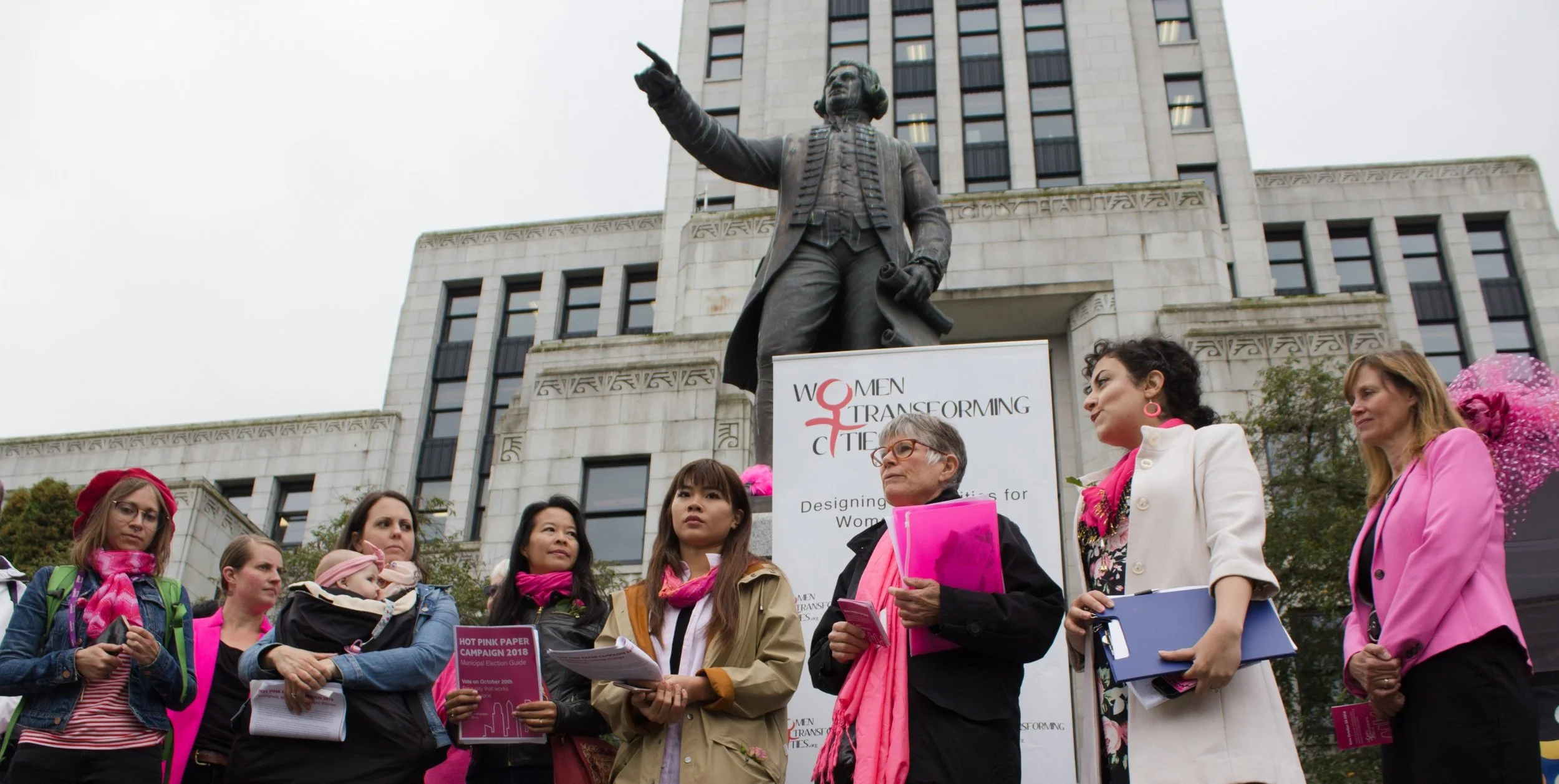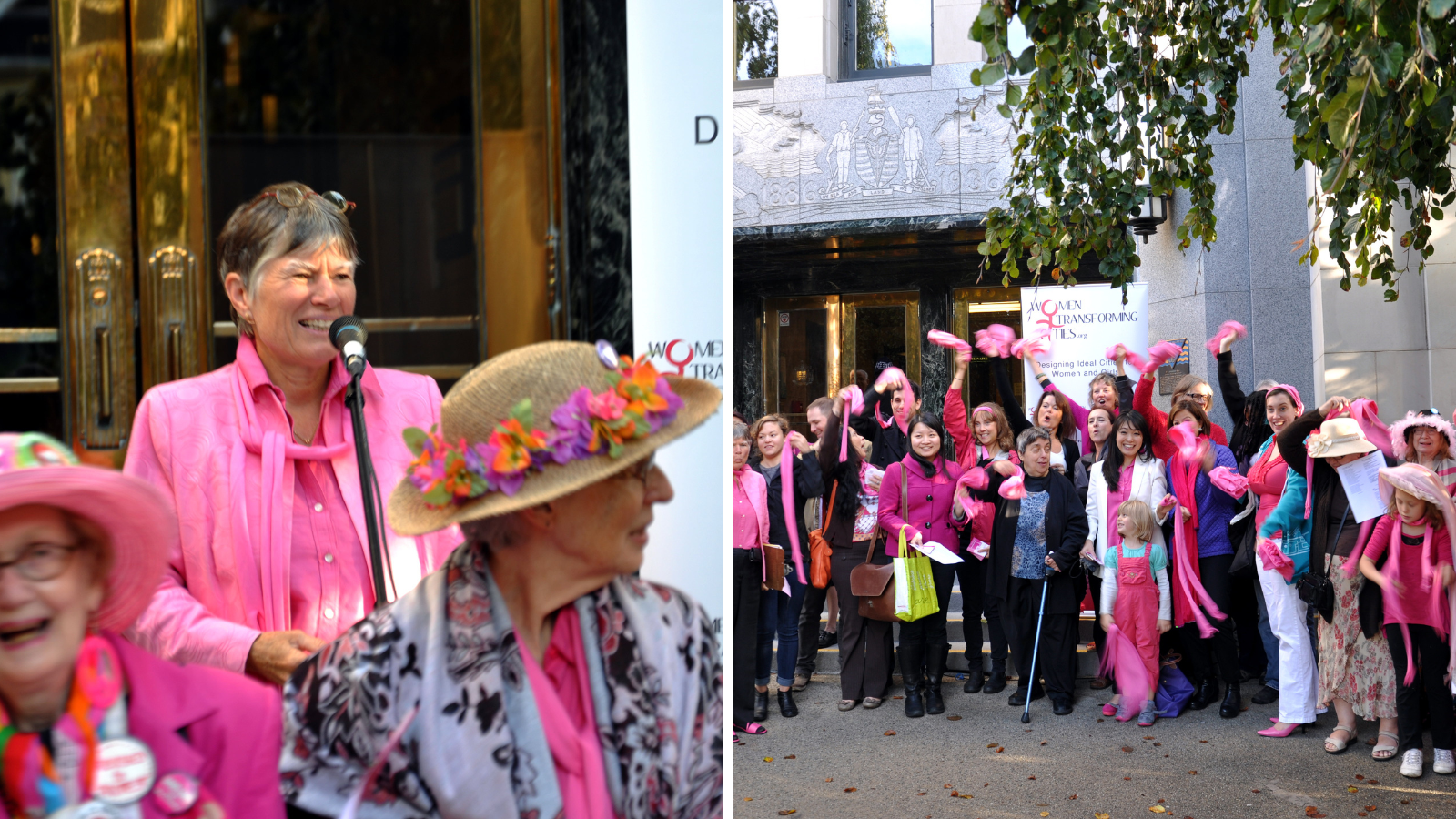From the Hot Pink Paper to Our City Hall campaign
In 2014, WTC founder and former Vancouver city councillor Ellen Woodsworth was frustrated by the lack of a gendered lens on decision-making in City Hall. Ellen and the WTC volunteer board started an election campaign to highlight the priorities of women in the city, inspired by feminist organizers in Europe and Ottawa. They called the initiative the Hot Pink Paper Campaign because hot pink represented a bold colour not reflected in municipal parties’ branding.
The Campaign has been a staple of the Vancouver local government elections for the past 10 years. For the 2026 election, it will be known by a new name that reflects the campaign's evolution: Our City Hall.
What began in 2014 as a way to bring a gendered lens into City Hall has grown into a sustained movement: every election cycle, WTC gathers community priorities, secures candidate pledges, and then holds elected officials accountable for their promises.
The campaign has successfully challenged mayoral and council candidates to look beyond the status quo and commit to concrete, intersectional policy asks on issues like housing, safety, climate, and accessibility. It has held them accountable to their priorities and helped centre the voices of underrepresented communities.
As we mark the launch of Our City Hall with one year to go until the October 2026 General Election, let’s look back on the herstory of the Hot Pink Paper Campaign.
2014: The first Hot Pink Paper Campaign
In 2014, WTC was an entirely volunteer-run organization. Volunteers worked with community members and partner organizations to identify 11 key issues that would make cities work better for women and girls. For each issue, they developed two to three concrete action recommendations, along with a backgrounder written by experts in the field. The group, led by Ellen Woodsworth, then stormed the city council chambers and handed the Mayor and City Councillors a pamphlet containing all their asks. The group hosted dialogue cafes in community spaces across the city to hear from residents. This first campaign reached over 10,000 people!
2018: The second Hot Pink Paper Campaign
Building on the success of the first campaign, during the 2018 municipal election, WTC hosted a forum called Hot Pink Pathways to a Women-Friendly Vancouver, as well as dialogue cafes on key issues for women in the city. The recommendations from this forum became the 2018 Hot Pink Paper “challenge” to candidates. The policy recommendations were launched on the steps of Vancouver City Hall in September 2018.
2022: The third Hot Pink Paper Campaign
The 2022 campaign was a significant milestone: for the first time, WTC had paid staff to organize the campaign. The campaign presented eight policy asks to all candidates for mayor and council. The policy asks reflected the priorities of more than 25 community organizations and 600 residents. For the 2022-2026 campaign, WTC published annual accountability reports on council’s progress (or lack thereof) towards their public commitments to equity-deserving residents. The pledge was also used during the April 2025 by-election.
The Impact of the Hot Pink Paper Campaign
Over 3 election cycles, the Hot Pink Paper Campaign has made a measurable impact on the attention given to gender equity in party platforms, election media coverage, and issues prioritized by council. Some notable impacts include:
In 2016 council adopted the “Access to City Services Without Fear” policy to remove barriers to city services for residents with precarious immigration status, advancing WTC’s 2014 recommendation of becoming a sanctuary city.
In 2018 council unanimously approved “A City for All Women,” a 10-year Women’s Equity Strategy. Actions from the strategy included participating in the UN Safe Cities study to address sexualized violence in public spaces, adopting the Equity Framework, and advancing the city’s response to the Red Women Rising Report and National Inquiry into Missing and Murdered Indigenous Women and Girls.
In 2022 council unanimously passed a motion reflecting our policy ask to reduce barriers to non-market housing.
Council included increasing public washroom access in their 2023-2026 strategic priorities and passed a motion related to our “Washrooms for All” policy ask in 2025.
In 2024, WTC successfully organized alongside climate justice, building, and health advocates to protect Vancouver’s ban on natural gas, a fundamental aspect of our 2022 climate emergency policy ask.
2026: Our City Hall Campaign
The Hot Pink Paper Campaign has a new name for the 2026 municipal election: Our City Hall. The new name reflects the mission of both the campaign and Women Transforming Cities, to build cities where everyone belongs, participates and thrives.
What hasn’t changed is our commitment to amplifying the voices of those often not heard in party platforms and council chambers. The relationships we've built with community organizations, labour groups, and residents across the city over more than a decade of Hot Pink Paper Campaigns will strengthen our work ahead to turn community priorities into council action.
The Our City Hall campaign can’t happen without community support, including our donors and volunteers. Find out how you can be part of the next iteration of the Hot Pink Paper.




